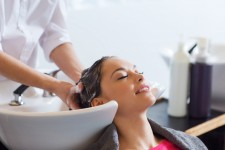Ditching the traditional shampoo for a more "natural" hair look may sound gross to some, but it's a growing trend among many and the hair-care industry is on board. We, on the other hand, hope people with hair don't jump on the bandwagon for the wrong reasons.
Playfully pegged the "no-poo" treatment, the trend got its legs in New York City. Stylists at a Manhattan salon say they've been able to tackle otherwise kinky, curly and unmanageable hair with the use of products containing aloe vera extracts and essential oils. This, they say, restores the hair's natural balance and creates more shine, rather than stripping it from its natural oils, as traditional shampoos apparently do.
Sure, not every scalp is equal, and neither is every brand of shampoo. There are the mainstream shampoos suitable for most scalps, and for normal, oily, and dry hair. There are shampoos specifically for those who have dandruff. And those with color-treated hair also have an array of products from which to choose.
Let's consider the most common ingredients that the 'no-poo' movement considers harmful:
- Sulfates The chemical detergents that give shampoo its foamy suds. They are harmless to most scalps, but may cause irritation, redness, and itching just like any other product if you have sensitive skin.
-
Quaternium-15 Is essentially a "chemical package" of formaldehyde the actual preservative that kills bacteria. It slowly breaks down in solution, gradually releasing the formaldehyde. Formaldehyde is toxic, but not in the tiny amounts that are present in the shampoo. Humans are well-equipped to deal with small amounts of the chemical. It is rapidly metabolized and eliminated. It is also found in many fruits and juices.
- Isopropyl Alcohol (rubbing alcohol) Cleans and dissolves oils. It is a very good solvent, so it can be "extremely drying and strip hair of moisture." This, of course, depends on the amount of the alcohol that is present. You shouldn't drink it, but it's very safe for routine use (as in an arm swab before an injection).
Shampoos also contain ingredients that activists approve of (assuming that this matters):
- Glycerin (aka glycerol) Helps retain hair moisture, and serves as a protective barrier to follicles.
- Nut and Seed Oils Avocado, shea butter, and others that naturally add moisture and shine to hair, while getting rid of greasy oils.
- Citric acid Helps keep shampoo pH balance to wash away dirt and restore shine and smoothness.
- Panthenol A component of one of the B vitamins; thickens hair follicles and helps restore shine.
Most of the ingredients above never get their honorable mentions, but a couple have been attacked for being carcinogens and toxic to public health claims that are not backed by sound science. (See our articles on Formaldehyde)
That said, we should all agree on one thing: Unless you suffer from allergies, there is simply no reason to wash your hair every day. Using product like dry shampoo, for example, restores what we call the hair 'oomph' while saving lots of time from blow drying and styling. Of course, if you exercise and sweat regularly, that might be the exception to this rule.
But consumers who forgo regular shampoo, for fear of being exposed to a product supposedly "full of toxic chemicals" are being sold a bill of organic goods. It's just another way to instill fear into consumers who were otherwise happy with their hair products, and get them to buy something which will almost certainly cost more and perform similarly.




